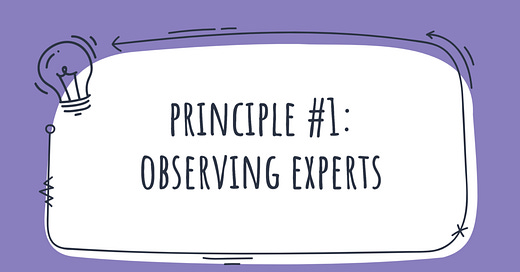Learning Science Principle #1: Observing Experts
Research shows that learners engage & achieve more when they see or hear experts thinking and talking about about the approach they take to solving problems and making decisions.

✏️ Learning Design Tips
Think about what you want to teach as a scenario featuring an expert in the field: show the expert completing a task and narrating their thoughts, decisions and actions as they go.
This “cognitive annotation” or “think-aloud strategy” is proven to lead to deeper and more rapid changes in both learner thought and behaviour (Bereiter & Bird, 1985; Quinn, 2005; Schoenfeld, 1992).
Example 1: Accounting 📈
You want your learners to be able to analyse a balance sheet. Show a financial accounting professional thinking aloud as she analyzes a company’s balance sheet.
What considerations does she have, what decisions does she make, how and why?
Example 2: Sales Skills 💰
Show a sales professional narrating a filmed interaction with a client, explaining what she was thinking as she modelled a particular sales technique.
Example 3: Medicine 🩺
Create a podcast-style interview with a doctor who explains their thought process as they respond to an emergency, profile their patients and decide on a suitable treatment.
🥷 Phil’s Ninja Tip > Mistakes Happen…
Include examples of when things go wrong or mistakes commonly made by novices.
Modelling mistakes and errors and exposing the thought processing around recognising and correcting errors can be as valuable as modelling perfect performance (Loibl & Rummel, 2014).
🧪 The Science Bit
Bereiter, C. & Bird, M. (1985). Use of thinking aloud in identification and teaching of reading comprehension strategies. Cognition and Instruction, 2(2), 131–156.
Loibl, K. & Rummel, N. (2014). The impact of guidance during problem-solving prior to instruction on students’ inventions and learning outcomes. Instructional Science, 42(3), 305–326.
Quinn, C. N. (2005). Engaging learning: Designing e-learning simulation games. San Francisco, CA: Pfeiffer.
Schoenfeld, A. H. (1992). Learning to think mathematically: Problem- solving, metacognition, and sense-making in mathematics.



